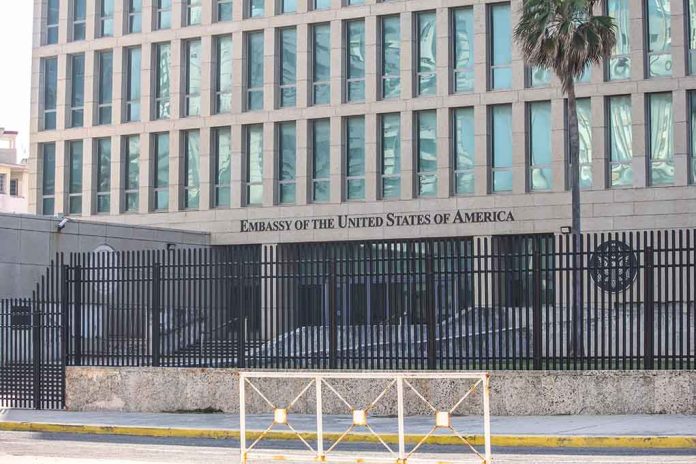
Former Ambassador Bridget Brink resigns in protest over Trump’s Ukraine policy, declaring she “cannot stand by” while America appeases Russia at the expense of a democratic ally.
Key Takeaways
- Former US Ambassador to Ukraine Bridget Brink resigned in April 2025 over fundamental disagreements with President Trump’s approach to the Russia-Ukraine conflict.
- Brink accused the Trump administration of putting pressure on Ukraine instead of Russia, effectively siding with the aggressor in the ongoing war.
- In her Detroit Free Press op-ed, Brink warned that “peace at any price is not peace at all—it is appeasement” of Russian aggression.
- Trump’s administration has suggested Ukraine may not regain its pre-2014 borders, drawing criticism for aligning with Kremlin narratives.
- Tensions between Brink and Ukrainian President Volodymyr Zelenskyy had increased before her departure, with Zelenskyy criticizing her diplomatic responses.
Diplomatic Break After Three Years of Service
Former US Ambassador to Ukraine Bridget Brink ended her diplomatic career in April 2025 after serving since May 2022. Her unexpected resignation came amid growing tensions with President Trump’s foreign policy team and their approach to the Russia-Ukraine conflict. In a strongly-worded opinion piece published in the Detroit Free Press, Brink outlined her reasons for departing a position she had held under five presidents from both political parties. The resignation marks a significant moment in American diplomacy toward Eastern Europe and highlights deep divisions within the foreign policy establishment over how to handle relations with Russia.
Brink’s departure reveals clear policy differences between career diplomats and President Trump’s vision for resolving the conflict. While the Biden administration had previously focused on supporting Ukraine’s territorial integrity and sovereignty, the current administration has taken a markedly different approach, seeking rapid resolution even at significant cost to Ukraine. This shift has alarmed many veterans of American foreign policy who see it as potentially undermining long-standing principles of supporting democracies against authoritarian aggression. The administration’s suggestion that Ukraine may not recover territories lost since 2014 has been particularly contentious.
Pressure on Ukraine Rather Than Russia
In her public statements, Brink directly challenged the wisdom of the current diplomatic strategy. “I respect the president’s right and responsibility to determine U.S. foreign policy. Unfortunately, the policy since the beginning of the Trump administration has been to put pressure on the victim, Ukraine, rather than on the aggressor, Russia,” said Bridget Brink, Former US Ambassador to Ukraine.
The tension between Trump and Ukrainian President Volodymyr Zelenskyy has escalated in recent months, with Trump reportedly referring to the Ukrainian leader as a “dictator” in private and temporarily suspending US aid shipments. Defense Secretary Pete Hegseth further inflamed the situation with public statements suggesting Ukraine should accept territorial losses. “We must start by recognising that returning to Ukraine’s pre-2014 borders is an unrealistic objective,” said Pete Hegseth, Defense Secretary.
Moral Stand Against “Appeasement”
Brink’s resignation represents more than a policy disagreement—it reflects her deeply held belief that the current approach risks long-term American security interests. Brink served as an ambassador under both Republican and Democratic administrations before reaching her breaking point with the current policy direction. Her public statements suggest she views the situation through a moral lens, seeing America’s credibility as a defender of democratic values at stake in the outcome of the Ukraine conflict. This principled stance has resonated with foreign policy traditionalists but drawn criticism from those who support the president’s approach.
“I cannot stand by while a country is invaded, a democracy bombarded, and children killed with impunity. I believe that the only way to secure U.S. interests is to stand up for democracies and to stand against autocrats. Peace at any price is not peace at all ― it is appeasement,” said Brink.
The administration has defended its approach as pragmatic and necessary to prevent further escalation with Russia. Supporters point to the newly established joint investment fund between the US and Ukraine, which grants American businesses access to Ukraine’s valuable mineral resources, as evidence of continued engagement and support. Critics, however, see this arrangement as exploitative of Ukraine’s vulnerable position and insufficient compensation for surrendering territorial sovereignty. The conflict has become the bloodiest in Europe since World War II, with devastating civilian casualties continuing to mount.
Tensions with Zelenskyy Before Departure
Interestingly, Brink’s relationship with President Zelenskyy had also become strained in her final weeks as ambassador. Ukrainian officials, including Zelenskyy himself, had criticized Brink for what they perceived as weak diplomatic responses to Russian missile strikes. This criticism from Ukrainian leadership came shortly before her resignation was announced by a State Department spokesperson, suggesting complex dynamics were at play beyond just her disagreements with the Trump administration. The criticism highlighted the increasingly difficult position American diplomats face when trying to balance competing interests in the region.
Trump has consistently blamed Ukraine’s NATO ambitions for provoking Russia’s invasion, a perspective that aligns closely with Russian President Vladimir Putin’s own justifications for the war. This stance represents a significant departure from the bipartisan consensus that had previously guided American foreign policy toward Russia and Ukraine. As the administration continues to reshape its approach to the conflict, Brink’s resignation stands as a powerful reminder of the profound disagreements over America’s proper role in defending democratic allies against authoritarian aggression.



